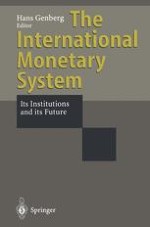1995 | OriginalPaper | Buchkapitel
Repairing the International Monetary System — An Unfinished Task?
verfasst von : Jacques J. Polak
Erschienen in: The International Monetary System
Verlag: Springer Berlin Heidelberg
Enthalten in: Professional Book Archive
Aktivieren Sie unsere intelligente Suche, um passende Fachinhalte oder Patente zu finden.
Wählen Sie Textabschnitte aus um mit Künstlicher Intelligenz passenden Patente zu finden. powered by
Markieren Sie Textabschnitte, um KI-gestützt weitere passende Inhalte zu finden. powered by
The disintegration of the European Monetary System that we have witnessed over the last 12 months proves once more that those of us who toil at the international monetary system would do well to adopt Sisyphus as our patron saint. Even the classical gold standard, sometimes described as the most efficient international monetary system that the world has ever seen — seen retrospectively, that is, and through rose-coloured glasses — did not endure for more than about a third of a century. It died with the outbreak of World War I. Something rather different under the same name was put together in 1925: that lasted for all of the next three years before it became a caricature of itself as the “Gold Bloc”. The US, UK and France then pushed the monetary stone a short distance back up the mountain when they entered into the Tripartite Agreement. With its 24-hour exchange rate guarantee, that was at best a ghost of a monetary system. The negotiators at Bretton Woods, operating further away from constraining realities, managed (so to say) to reach the top of Mount Washington in agreeing on the Articles of the International Monetary Fund. The Fund contained all the required ingredients of John Williamson’s (1983) definition of an international monetary system: an exchange rate regime — par values; a reserve regime — understood to be gold and dollars; and at least an implied system of adjustment obligations — consisting of the need to qualify for Fund credit for the deficit countries and the scarce currency provisions for what was expected to be the solitary surplus country in the system.
